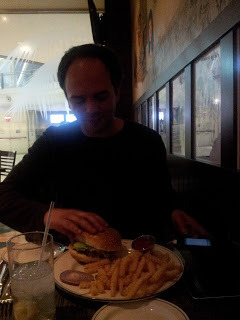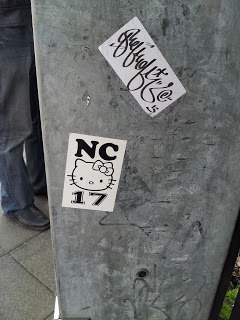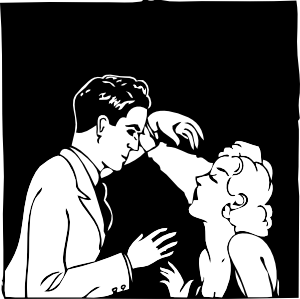Luna (Lindsey) Corbden's Blog, page 4
June 18, 2013
Iceland Fire: A Week With No Night: Part One
Roland and I met at a party five years ago, and that encounter changed my life.
 Reenactment of Luna meeting Roland.To celebrate our fifth anniversary, Roland took us to Iceland. When I suggested it to him, I expected to have to persuade, but it turns out he was thinking the same thing. We'd both heard good things about it from regular world-travelers, as the kind of place worth going back to. I've been to Belize, which also falls into this category, and that's exactly the kind of place we wanted to go.
Reenactment of Luna meeting Roland.To celebrate our fifth anniversary, Roland took us to Iceland. When I suggested it to him, I expected to have to persuade, but it turns out he was thinking the same thing. We'd both heard good things about it from regular world-travelers, as the kind of place worth going back to. I've been to Belize, which also falls into this category, and that's exactly the kind of place we wanted to go.
Now remember from grade school that Iceland is green, and Greenland is ice. This is a very important fact. There are lots of important facts about Iceland, which have been exhaustively recorded on Wikipedia. The primary fact I hope to convey is that Iceland is awesome.
 This is me in a bar at JFK seriously explaining something very silly.
This is me in a bar at JFK seriously explaining something very silly.
 And Roland of course. He didn't get silly till the last day.We left the house at about 9am PDT and with two long flights, a layover, and the time change to GMT, we got there at around 9am the next day. And they say time travel is impossible. HA! (Why do time travel stories never talk about the jet lag??)
And Roland of course. He didn't get silly till the last day.We left the house at about 9am PDT and with two long flights, a layover, and the time change to GMT, we got there at around 9am the next day. And they say time travel is impossible. HA! (Why do time travel stories never talk about the jet lag??)
 Our plane flew over a blurry world in a wide arc.
Our plane flew over a blurry world in a wide arc.
Look, it's Greenland, not being very green.
I watched the coast approach with eagerness, and saw one lone light on the northern shore... and then nothing.
At some point, a sea of clouds grew. Optical illusions through an airplane window are so fun and frustrating to figure out. It was just dark enough to not be able to tell sea from cloud... or maybe it was fog. Whatever it was, it went on forever, at least until about 2:30am local time, when I saw the sun begin to rise in the north.
Wow.
It was a long sunrise, as the sun lingered there just below the edge of the clouds. At 35000ft, I could see the curve of the earth, and we were as much in space as we were in the air. Eventually, the sun came up well and good. I had hoped to catch a glimpse of Greenland from my window, but saw nothing but clouds for what must have been thousands of miles.
And then we landed and as soon as I could, I started taking pictures of signs.
 Standard "Exit" sign, with the voice of GLADOS
Standard "Exit" sign, with the voice of GLADOS
as a constant reminder of the stakes of failure.
 Some of the first Icelandic I got to read.
Some of the first Icelandic I got to read.
In a different elevator, I saw this written as "Menns".
 The language of coffee is spoken the world over. It is the one true word.
The language of coffee is spoken the world over. It is the one true word.
 Art at the Keflavik airport. Notice there's more art in the far distance.
Art at the Keflavik airport. Notice there's more art in the far distance.
 What is this I don't even...
What is this I don't even...
A retro ice cream ad on the back of a gas station.
MONKEYWe rented a car. An SUV to be exact. Best. Decision. Ever. As soon as we got settled into the hotel room we went for a walk through Reykjavik's downtown. Over the four days we had there, we took many walks through Reykjavik and quickly became familiar with Iceland's biggest town, which had this odd feel of a big city and a small town all at once. As I tweeted, all roads in Reykjavik lead to all other roads in Reykjavik, and this is exactly true. (And all roads in Iceland lead similarly to Reykjavik.) Whether driving or walking, we quickly learned how to get around. Make a wrong tern? Keep driving and you'll get there eventually.
I'm a huge word-nerd, and now that I know I have Asperger's, with a focus on verbal, my obsession with Icelandic makes total sense. I wanted to live there just so I could learn the language. To my delight, all the signs were in Icelandic. My brain delighted in trying to figure out how to pronounce things. While I was still struggling with some vowels, I think I had the hang of it by the time we left. I particularly delighted in seeing Thorn (þ) and Eth (ð) in so many words, and knowing immediately to make the "th" or the other "th" sound.
 The alphabet is for þorn.
The alphabet is for þorn.
* NOT the Icelandic alphabet (anymore).I began to figure out what words meant just by context (especially kaffir and te, aka coffe and tea), and I learned a few phrases (which I was too shy to say) from this great series on YouTube. Takk fyrir!
But everyone spoke English, so we could get around comfortably.
Anyway, downtown Reykjavik. Narrow cobblestone streets. Lots of shops and bars. And lots of street art. Roland and I captured these images over our many walks.
 The giraffe says "I have come here to chew bubblegum and kick ass." I'm not sure if he's out of bubblegum.
The giraffe says "I have come here to chew bubblegum and kick ass." I'm not sure if he's out of bubblegum.

 Just... amazing.
Just... amazing.
 Why... hello kitty.
Why... hello kitty.
 Translation: Dust settles in the lungs; Studded tires unnecessarily in Reykjavik
Translation: Dust settles in the lungs; Studded tires unnecessarily in Reykjavik
 Money destroying art and culture.
Money destroying art and culture.
(And dangling participles destroying grammar and clarity.) Roland taking a picture of me taking a picture of him.
Roland taking a picture of me taking a picture of him.
 Me taking a picture of Roland taking a picture of me.
Me taking a picture of Roland taking a picture of me.
(Oh, and giant books.) This alley is full of wonders...
This alley is full of wonders...
 A brick portal...
A brick portal...
 Wet paint tetris...
Wet paint tetris...
 The northern lights over Reykjavik...
The northern lights over Reykjavik...
 Ravens... they're really big on ravens there...
Ravens... they're really big on ravens there...
 ...and my favorite kind of graffiti!
...and my favorite kind of graffiti!
The cute kind. In the courtyard of a bar called Faktorý.
In the courtyard of a bar called Faktorý.
 On the wall of our favorite bar, Boston.
On the wall of our favorite bar, Boston.
 A metaphor of how America is destroying
A metaphor of how America is destroying
the world's limited supply of triangles.But wait, there's more. As we wandered up the street, a gap in the buildings opened up into a park...

Every square inch of wall in this park is painted. I painstakingly tried to capture it all.

One recurring theme in the street art (this one's the only one I shot) were these poems. I didn't take the time to notice if they were the same author. This one says:
















Okay that was alot of graffiti pics. Please stay tuned for Part Two, in which I talk about food, bars, the countryside, ancient churches, and socialized medicine...
 Reenactment of Luna meeting Roland.To celebrate our fifth anniversary, Roland took us to Iceland. When I suggested it to him, I expected to have to persuade, but it turns out he was thinking the same thing. We'd both heard good things about it from regular world-travelers, as the kind of place worth going back to. I've been to Belize, which also falls into this category, and that's exactly the kind of place we wanted to go.
Reenactment of Luna meeting Roland.To celebrate our fifth anniversary, Roland took us to Iceland. When I suggested it to him, I expected to have to persuade, but it turns out he was thinking the same thing. We'd both heard good things about it from regular world-travelers, as the kind of place worth going back to. I've been to Belize, which also falls into this category, and that's exactly the kind of place we wanted to go.Now remember from grade school that Iceland is green, and Greenland is ice. This is a very important fact. There are lots of important facts about Iceland, which have been exhaustively recorded on Wikipedia. The primary fact I hope to convey is that Iceland is awesome.
 This is me in a bar at JFK seriously explaining something very silly.
This is me in a bar at JFK seriously explaining something very silly. And Roland of course. He didn't get silly till the last day.We left the house at about 9am PDT and with two long flights, a layover, and the time change to GMT, we got there at around 9am the next day. And they say time travel is impossible. HA! (Why do time travel stories never talk about the jet lag??)
And Roland of course. He didn't get silly till the last day.We left the house at about 9am PDT and with two long flights, a layover, and the time change to GMT, we got there at around 9am the next day. And they say time travel is impossible. HA! (Why do time travel stories never talk about the jet lag??) Our plane flew over a blurry world in a wide arc.
Our plane flew over a blurry world in a wide arc.Look, it's Greenland, not being very green.
I watched the coast approach with eagerness, and saw one lone light on the northern shore... and then nothing.
At some point, a sea of clouds grew. Optical illusions through an airplane window are so fun and frustrating to figure out. It was just dark enough to not be able to tell sea from cloud... or maybe it was fog. Whatever it was, it went on forever, at least until about 2:30am local time, when I saw the sun begin to rise in the north.
Wow.
It was a long sunrise, as the sun lingered there just below the edge of the clouds. At 35000ft, I could see the curve of the earth, and we were as much in space as we were in the air. Eventually, the sun came up well and good. I had hoped to catch a glimpse of Greenland from my window, but saw nothing but clouds for what must have been thousands of miles.
And then we landed and as soon as I could, I started taking pictures of signs.
 Standard "Exit" sign, with the voice of GLADOS
Standard "Exit" sign, with the voice of GLADOS as a constant reminder of the stakes of failure.
 Some of the first Icelandic I got to read.
Some of the first Icelandic I got to read. In a different elevator, I saw this written as "Menns".
 The language of coffee is spoken the world over. It is the one true word.
The language of coffee is spoken the world over. It is the one true word.
 Art at the Keflavik airport. Notice there's more art in the far distance.
Art at the Keflavik airport. Notice there's more art in the far distance.
 What is this I don't even...
What is this I don't even...A retro ice cream ad on the back of a gas station.
MONKEYWe rented a car. An SUV to be exact. Best. Decision. Ever. As soon as we got settled into the hotel room we went for a walk through Reykjavik's downtown. Over the four days we had there, we took many walks through Reykjavik and quickly became familiar with Iceland's biggest town, which had this odd feel of a big city and a small town all at once. As I tweeted, all roads in Reykjavik lead to all other roads in Reykjavik, and this is exactly true. (And all roads in Iceland lead similarly to Reykjavik.) Whether driving or walking, we quickly learned how to get around. Make a wrong tern? Keep driving and you'll get there eventually.
I'm a huge word-nerd, and now that I know I have Asperger's, with a focus on verbal, my obsession with Icelandic makes total sense. I wanted to live there just so I could learn the language. To my delight, all the signs were in Icelandic. My brain delighted in trying to figure out how to pronounce things. While I was still struggling with some vowels, I think I had the hang of it by the time we left. I particularly delighted in seeing Thorn (þ) and Eth (ð) in so many words, and knowing immediately to make the "th" or the other "th" sound.
 The alphabet is for þorn.
The alphabet is for þorn.* NOT the Icelandic alphabet (anymore).I began to figure out what words meant just by context (especially kaffir and te, aka coffe and tea), and I learned a few phrases (which I was too shy to say) from this great series on YouTube. Takk fyrir!
But everyone spoke English, so we could get around comfortably.
Anyway, downtown Reykjavik. Narrow cobblestone streets. Lots of shops and bars. And lots of street art. Roland and I captured these images over our many walks.
 The giraffe says "I have come here to chew bubblegum and kick ass." I'm not sure if he's out of bubblegum.
The giraffe says "I have come here to chew bubblegum and kick ass." I'm not sure if he's out of bubblegum.

 Just... amazing.
Just... amazing.
 Why... hello kitty.
Why... hello kitty.
 Translation: Dust settles in the lungs; Studded tires unnecessarily in Reykjavik
Translation: Dust settles in the lungs; Studded tires unnecessarily in Reykjavik
 Money destroying art and culture.
Money destroying art and culture.(And dangling participles destroying grammar and clarity.)
 Roland taking a picture of me taking a picture of him.
Roland taking a picture of me taking a picture of him. Me taking a picture of Roland taking a picture of me.
Me taking a picture of Roland taking a picture of me.(Oh, and giant books.)
 This alley is full of wonders...
This alley is full of wonders...
 A brick portal...
A brick portal...
 Wet paint tetris...
Wet paint tetris...
 The northern lights over Reykjavik...
The northern lights over Reykjavik...
 Ravens... they're really big on ravens there...
Ravens... they're really big on ravens there...
 ...and my favorite kind of graffiti!
...and my favorite kind of graffiti!The cute kind.
 In the courtyard of a bar called Faktorý.
In the courtyard of a bar called Faktorý.
 On the wall of our favorite bar, Boston.
On the wall of our favorite bar, Boston.
 A metaphor of how America is destroying
A metaphor of how America is destroying the world's limited supply of triangles.But wait, there's more. As we wandered up the street, a gap in the buildings opened up into a park...

Every square inch of wall in this park is painted. I painstakingly tried to capture it all.

One recurring theme in the street art (this one's the only one I shot) were these poems. I didn't take the time to notice if they were the same author. This one says:
Just look at how the mountains so very mighty be
sharp as razors at the top they span the land and sea
but don't forget that though
majestic spires capped with snow..
















Okay that was alot of graffiti pics. Please stay tuned for Part Two, in which I talk about food, bars, the countryside, ancient churches, and socialized medicine...
Published on June 18, 2013 17:40
May 15, 2013
Mind Control 101: Myths of Brainwashing
 Mind catrol - ur doing it rong akshully
Mind catrol - ur doing it rong akshullyI've studied a lot about mind control over the years. My interest piqued shortly after I left a rigorous and restrictive religion (Mormonism). I wanted to better understand how I had willingly allowed myself to be controlled, all the while believing and protesting loudly that I was free.
These methods are deceptive and unethical, tricking the mind rather than persuading through honesty and reason. Knowing this, I now have a very unique perspective on American politics. I can see these techniques used all the time, by politicians, media, and regular people.
This is not owing to a vast conspiracy. It doesn't take an evil mastermind to notice certain approaches work better to persuade. These methods have always worked and will always continue to work, and so they perpetuate through society. Some who study memetics might even say these approaches are living things that self-replicate and spread though human minds.
This post begins a series called "Mind Control 101", which precedes its non-evil step-twin, "Logical Fallacies 101".
Please do not use this as a How To! I address this topic not with the intent that you try to take over the world. I instead wish to make you better able to defend yourself when your mind comes under assault. I think of it as a defense against the dark arts course.
Let's begin with the myths. The entire subject of brainwashing is "loaded". Loading Language is itself a mind control technique that limits thought by giving you preconceived and highly incorrect notions. I'll start "deprogramming" you by showing where your existing understanding of the topic is far from reality.
When I say these words, "Thought Control" or "Brainwashing", you no doubt envision a wild-haired hypnotist swinging a silver watch, while a stern doctor injects your arm with a strange serum. In the background, hooded figures chant, and soon your eyes begin to glaze over. All the while you are helpless to resist because you are strapped to a chair.
This is all complete fantasy. Here's the great secret: while being brainwashed, you feel in complete control of yourself. You are cooperating. A much more accurate term is "coercive persuasion", because you are persuaded to want the same thing the manipulator wants, to believe as he wants you to believe.
Those who have been thusly persuaded never know they have been brainwashed. Conversely if you're sure you've been brainwashed, you probably haven't been.
So let's dispel some myths, shall we?
Thought reform does not require physical restraint.
Scientists used to think this, back in the 1950s, when American POWs returned from Korea singing the praises of their captors. But coercive persuasion in our free society requires a little more finesse. No force is required. All it takes is listening to someone who is talking. It also requires that you trust them and like them, at least a little bit. If they do their job right, you will go willingly.
 This picture is totally photoshopped.
This picture is totally photoshopped.It does not involve hypnotic disks.
Hypnosis is a broad word that means any varying state of consciousness other than the one you're probably experiencing now. Various levels of hypnosis, trance, and meditation are sometimes used by cult groups, but this is never, ever a requirement.
No drugs, truth serums, elixirs, or magical incantations are used in brainwashing.
Other than a few 60's cults that were using drugs anyway, I've never come across any thought reform involving chemicals. Nor does it have anything to do with Satan. No demonic possession, summoning of evil spirits, or worshiping pagan gods is required. Brainwashing is not about the content of the doctrine, but about the methods used to make you believe it, and never want to leave it.
Brainwashed people are not glassy-eyed, drooling zombies.
Most actually appear quite normal. In fact, I would venture to say everyone ends up brainwashed to one degree or another, at some point in their lives. Our brains seem wired to accept manipulation and deception. It seems logical that humankind would have better survived those very dangerous first 100,000 years of pre-history by following a leader without question. Thought control merely capitalizes on those built-in survival skills we are all born with.
There is absolutely no way to know that you've been brainwashed.
That's exactly the point. If you knew you were being controlled, you wouldn't like it very much, and you wouldn't stand for it. The manipulated fully believe they are making their own choices, that they are completely free to act in any way they choose.
A good deal of brainwashing involves setting up trigger thoughts, little tricks and traps that help you deflect any incoming facts, beliefs, thoughts, or feelings that would make you suddenly stop believing the lies you've been duped into. Part of this series is going to be identifying those traps, so you can avoid them in the first place.
(I could say "...and so you can escape if you're already brainwashed." But you see, if I were to accuse you of being controlled, you would immediately become defensive and protest, thinking, "There is no possible way!" That is exactly what I'm talking about.)
There is no "one size fits all" method of mind control.
To paraphrase Abraham Lincoln, you can control some of the people all of the time, or all the people some of the time, but you can't control all the people all the time. Manipulators throw out a line with some bait to see what bites. Sometimes it's you, but usually you will laugh at their crazy ideas. Everyone is ripe for being manipulated at some point in their lives. Someone has something to say that will appeal specifically to you. You will always be able to see how other people are being brainwashed, but you won't necessarily notice when it's happening to you, because you will like it.
There are a lot of mind control tricks, but not all are required.
There isn't a checklist that says, "Must meet all 50 requirements to be considered mind control". To control, you only need to do what works.
Brainwashing is not total.
It is possible to be partly brainwashed. You can be brainwashed about certain topics but not others. You can be brainwashed to the point of doing or believing almost everything the leader wants, but not quite. Victims of mind control can eventually be freed.
 A completely staged, totally unrealistic depiction of a typical brainwasher.
A completely staged, totally unrealistic depiction of a typical brainwasher. (Note the evil eyebrows.)Brainwashers are not creepy, bizarre, crazy, mean-spirited men who ooze evil and darkness from every pore.
Images of cackling, sneering, British-accent-wielding villains were created for the drama of movie fiction, not to reflect reality.
If you're going to be good at manipulation, you've got to be likable. To persuade, you must be charismatic. To convince, you must be, well... convincing. I listened to old recordings of Jim Jones taped just before the infamous Jonestown kool-aid mass-suicides and he sounded sincere, kind, loving, and wise.
Furthermore, controlling groups or ideologies work best when believers are taught to use brainwashing techniques themselves. That's right. In almost every case, the controlled end up controlling.
No one is immune from mind control.
Not even me, not even after all I've learned about it. I can build up defenses, but even then I will be susceptible to it at some point.
Conclusion
Now you know what mind control is not, which gives you an advantage over most people. In the next post I will, in the most basic of terms, describe what it is. Later on, I will delve into the details each technique so you can learn to recognize these methods in the wild.
Published on May 15, 2013 10:06
April 25, 2013
Evidence of the Flying Spaghetti Monster in Biblical Teachings
Much as been made in the Creationism debate of just who created the Earth. Was it Jehovah, the God of the Bible? Was it Atum who ejaculated human kind into the world? Was it Ahura Mazda who made a mountain grow so high it punctured the sky and rained down all known things?
Or maybe it the Flying Spaghetti Monster. But why her? There is no ancient evidence of her existence. She was just made up in 2005 by Teacher Bobby Henderson (blessed be his name) who was trying to prove a point. No one can even decide her gender!
But I'm here to tell you there is plenty of evidence, just as much evidence as we have for any other religion with ancient roots. You see, the Bible itself is full of references to the Flying Spaghetti Monster and her doctrines. In fact, the Bible was originally about the FSM, until it was co-opted and infected by the much later faiths of Judaism and Christianity.
Or you be realistic and assume Pastfarianism is in its infancy, that the religion only a few years old. (Because it is.) The core scriptures consist of one open letter written to American school boards, one drawing of the FSM making some mountains and a midget, a graph, and a few miscellaneous photographs taken by zealots. There are only three tenets to the faith so far: A Flying Spaghetti Monster created the universe.The first human was a pregnant midget. The decline in the world's pirate population is leading to global warming, hence pirates are very important. With just those three doctrines, and one hour, just a few months after the FSM was "invented", and using the Holy Book of another religion, I was able to find plenty of biblical support for the Pastafarian faith. The odds were stacked very much against me.
If I can so easily reverse-engineer the Bible using confirmation bias, then what does that say about all other modern interpretations of the Bible?
Imagine if a Holy Book had been written with the doctrines of the FSM in mind all along, written and maintained by faithful Pastafarians, for thousands of years. Imagine if they were able to choose who's life stories and biographies were put in the Holy Book, and what information would be ignored. Imagine that thousands of the most dedicated Pastafarian clergy spent their entire lives studying that book and trying to make it fit their worldview.
Christians have misunderstood this concept of God to be a white human male on a throne, but I am unable to find any strong biblical evidence to support this. Therefore, I am going to assume that all biblical references to "God" or "the Lord" are referring of course to the actual creator of all the universe... the Flying Spaghetti Monster. The Creator is "God", then we can easily translate the word "God" to "FSM".
In my studies, I was very surprised at the emphasis the bible gives to Pasta. So much so that I included a tiny fraction of the scriptures that speak of pasta.
Let me clarify what I mean. Pasta is made from grain which is ground, mixed with water into a paste, and cooked. There is no yeast in Pasta, otherwise it would rise, and be called "bread".
Since the Children of Israel were not Italian, they didn't have the word "Pasta" or "Spaghetti", but it is clear that the term "unleavened bread" can only refer to pasta. Unleavened bread is also made by mixing grain with water and baking it. By cutting that into strips, you have pasta of various types, or if you don't cut it, you have lasagna... which is also pasta.
Spaghetti is simply one of the thinnest-cut categories of pasta.
Pasta played a major religious role in the lives of the Hebrews. The Children of Israel were commanded to feast on unleavened bread, in a manner that was a type of the Flying Spaghetti Monster, to remind them of His role in their lives.
This was an especially important during the religious feast of the Passover. Many think the Passover refers to when the destroying angel passed over the homes of the Israelites in Egypt, sparing the lives of their firstborn, however, few understand that the people had celebrated this holiday long before their captivity in the land of Egypt. The word "Passover" actually refers to when the Flying Spaghetti Monster passed over the earth, making the mountains and trees, and one pregnant midget, thereby completing creation.
Here are some selected scriptures talking about the use of Pasta in Israelite culture:
Exodus 12:8-11:
Duet. 16:4, "Let no yeast be found in your possession in all your land for seven days."
And a strong admonition to always partake of pasta:
Exodus 12:20, "Eat nothing made with yeast. Wherever you live, you must eat unleavened bread."
His Stringiness hates fluffy bread, and cannot stand to see it in his temples, or with his holy sacrifices:
Exodus 23:18, "Do not offer the blood of a sacrifice to me along with anything containing yeast."
More on the diets of the Children of Israel:
Duet 14:3-8
Judges 6:17-22 tells of an encounter Gideon had with an Angelic messenger from His Noodliness. Gideon is given an object lesson that reminds him of when the FSM created the mountains:
Haggai 2:12-13:
Mark 8:15, "Be careful," Jesus warned them. "Watch out for the yeast of the Pharisees and that of Herod."
This story is repeated in Luke 12:1, where we come to better understand why this was an insult. Jesus taught that yeast represents hypocrisy. It does nothing but add air to the grain, so that you think there is more to it than there really is. The bread looks filling, but it is empty. "Be on your guard against the yeast of the Pharisees, which is hypocrisy."
Like Jesus said elsewhere, "Man cannot live on bread alone".
Yeast also represents evil. 1 Cor 5:8, "Therefore let us keep the Festival, not with the old yeast, the yeast of malice and wickedness, but with bread without yeast, the bread of sincerity and truth."
Yes, let us be touched by the Noodly Appendage of sincerity and truth!
Pirates are also an important doctrine of the Pastafarians. The bible makes a few mentions of pirates, though back then they were called Phoenicians, and before that they didn't have a word for them.
Here is a nice poem about pirates in Judges 5:17:
2 Chron 8:18:
Here is a prophecy. As we all know, the pirates found refuge in the Caribbean, in the "West", and were hired by Britain to attack the Spanish in the "South":
Daniel 11:29-30:
In the name of cheese and rice, ramen.
Or maybe it the Flying Spaghetti Monster. But why her? There is no ancient evidence of her existence. She was just made up in 2005 by Teacher Bobby Henderson (blessed be his name) who was trying to prove a point. No one can even decide her gender!
But I'm here to tell you there is plenty of evidence, just as much evidence as we have for any other religion with ancient roots. You see, the Bible itself is full of references to the Flying Spaghetti Monster and her doctrines. In fact, the Bible was originally about the FSM, until it was co-opted and infected by the much later faiths of Judaism and Christianity.
Or you be realistic and assume Pastfarianism is in its infancy, that the religion only a few years old. (Because it is.) The core scriptures consist of one open letter written to American school boards, one drawing of the FSM making some mountains and a midget, a graph, and a few miscellaneous photographs taken by zealots. There are only three tenets to the faith so far: A Flying Spaghetti Monster created the universe.The first human was a pregnant midget. The decline in the world's pirate population is leading to global warming, hence pirates are very important. With just those three doctrines, and one hour, just a few months after the FSM was "invented", and using the Holy Book of another religion, I was able to find plenty of biblical support for the Pastafarian faith. The odds were stacked very much against me.
If I can so easily reverse-engineer the Bible using confirmation bias, then what does that say about all other modern interpretations of the Bible?
Imagine if a Holy Book had been written with the doctrines of the FSM in mind all along, written and maintained by faithful Pastafarians, for thousands of years. Imagine if they were able to choose who's life stories and biographies were put in the Holy Book, and what information would be ignored. Imagine that thousands of the most dedicated Pastafarian clergy spent their entire lives studying that book and trying to make it fit their worldview.
Christians have misunderstood this concept of God to be a white human male on a throne, but I am unable to find any strong biblical evidence to support this. Therefore, I am going to assume that all biblical references to "God" or "the Lord" are referring of course to the actual creator of all the universe... the Flying Spaghetti Monster. The Creator is "God", then we can easily translate the word "God" to "FSM".
In my studies, I was very surprised at the emphasis the bible gives to Pasta. So much so that I included a tiny fraction of the scriptures that speak of pasta.
Let me clarify what I mean. Pasta is made from grain which is ground, mixed with water into a paste, and cooked. There is no yeast in Pasta, otherwise it would rise, and be called "bread".
Since the Children of Israel were not Italian, they didn't have the word "Pasta" or "Spaghetti", but it is clear that the term "unleavened bread" can only refer to pasta. Unleavened bread is also made by mixing grain with water and baking it. By cutting that into strips, you have pasta of various types, or if you don't cut it, you have lasagna... which is also pasta.
Spaghetti is simply one of the thinnest-cut categories of pasta.
Pasta played a major religious role in the lives of the Hebrews. The Children of Israel were commanded to feast on unleavened bread, in a manner that was a type of the Flying Spaghetti Monster, to remind them of His role in their lives.
This was an especially important during the religious feast of the Passover. Many think the Passover refers to when the destroying angel passed over the homes of the Israelites in Egypt, sparing the lives of their firstborn, however, few understand that the people had celebrated this holiday long before their captivity in the land of Egypt. The word "Passover" actually refers to when the Flying Spaghetti Monster passed over the earth, making the mountains and trees, and one pregnant midget, thereby completing creation.
Here are some selected scriptures talking about the use of Pasta in Israelite culture:
Exodus 12:8-11:
8 That same night they are to eat the meat roasted over the fire, along with bitter herbs, and bread made without yeast. 9 Do not eat the meat raw or cooked in water, but roast it over the fire-head, legs and inner parts. 10 Do not leave any of it till morning; if some is left till morning, you must burn it. 11 This is how you are to eat it: with your cloak tucked into your belt, your sandals on your feet and your staff in your hand.Here is another verse, condemning fluffy bread:
In addition to the pasta they ate in remembrance of the FSM, the meat they are to serve is clearly meatballs, which are made of the ground up bits of all parts of the animal -- the head, legs, and inner parts.
Duet. 16:4, "Let no yeast be found in your possession in all your land for seven days."
And a strong admonition to always partake of pasta:
Exodus 12:20, "Eat nothing made with yeast. Wherever you live, you must eat unleavened bread."
His Stringiness hates fluffy bread, and cannot stand to see it in his temples, or with his holy sacrifices:
Exodus 23:18, "Do not offer the blood of a sacrifice to me along with anything containing yeast."
More on the diets of the Children of Israel:
Duet 14:3-8
3 Do not eat any detestable thing. 4 These are the animals you may eat: the ox, the sheep, the goat, 5 the deer, the gazelle, the roe deer, the wild goat, the ibex, the antelope and the mountain sheep. 6 You may eat any animal that has a split hoof divided in two and that chews the cud. 7 However, of those that chew the cud or that have a split hoof completely divided you may not eat the camel, the rabbit or the coney. Although they chew the cud, they do not have a split hoof; they are ceremonially unclean for you. 8 The pig is also unclean; although it has a split hoof, it does not chew the cud.Everyone knows that meatballs are made of cow meat, which is an animal with split hooves and which chews its cud. Sometimes meatballs are also made from mutton or goat, but only when beef is unavailable, or if you're a Hindu Pastafarian. If you are a vegetarian Pastafarian, you can skip the meatballs all together.
Judges 6:17-22 tells of an encounter Gideon had with an Angelic messenger from His Noodliness. Gideon is given an object lesson that reminds him of when the FSM created the mountains:
17 Gideon replied, "If now I have found favor in your [the Lord's] eyes, give me a sign that it is really you talking to me. 18 Please do not go away until I come back and bring my offering and set it before you." And the LORD said, "I will wait until you return."Here is an inspiring account of the creation story as told in Psalm 78:
19 Gideon went in, prepared a young goat, and from an ephah [3/5ths of a bushel] of flour he made bread without yeast [spaghetti]. Putting the meat [meatballs] in a basket and its broth [tomato sauce] in a pot, he brought them out and offered them to him under the oak.
20 The angel of God said to him, "Take the meat and the unleavened bread [spaghetti], place them on this rock [representing the mountains], and pour out the broth." And Gideon did so. 21 With the tip of the staff that was in his hand, the angel of the LORD touched the meat and the unleavened bread [with his noodly appendage]. Fire flared from the rock, consuming the meat and the bread. And the angel of the LORD disappeared. 22 When Gideon realized that it was the angel of the LORD, he exclaimed, "Ah, Sovereign LORD! I have seen the angel of the LORD face to face!"
23 Yet he gave a command to the skies above and opened the doors of the heavens;And some lines from Ezekiel 24 help us understand how the Flying Spaghetti Monster was himself created, and how we may emulate him and be purified:
24 he rained down manna for the people to eat, he gave them the grain of heaven.
25 Men ate the bread of angels; he sent them all the food they could eat.
26 He let loose the east wind from the heavens and led forth the south wind by his power.
27 He rained meat down on them like dust, flying birds like sand on the seashore.
10 So heap on the wood and kindle the fire. Cook the meat well, mixing in the spices; and let the bones be charred.This next reference means the meaty goodness of his Noodiliness is holy and pure, whereas the meat of the flesh is unclean. But his holiness will not make us clean:
11 Then set the empty pot on the coals till it becomes hot and its copper glows so its impurities may be melted and its deposit burned away.
Haggai 2:12-13:
12 If a person carries consecrated meat in the fold of his garment, and that fold touches some bread or stew, some wine, oil or other food, does it become consecrated?'" The priests answered, "No."Jesus was a great prophet of the Flying Spaghetti Monster, who came to us in human form so as not to scare us. He also abhorred yeast. That he used it to insult his enemies showed that the Jews of the time had carried on the important tradition of their ancestors:
13 Then Haggai said, "If a person defiled by contact with a dead body touches one of these things, does it become defiled?" "Yes," the priests replied, "it becomes defiled."
Mark 8:15, "Be careful," Jesus warned them. "Watch out for the yeast of the Pharisees and that of Herod."
This story is repeated in Luke 12:1, where we come to better understand why this was an insult. Jesus taught that yeast represents hypocrisy. It does nothing but add air to the grain, so that you think there is more to it than there really is. The bread looks filling, but it is empty. "Be on your guard against the yeast of the Pharisees, which is hypocrisy."
Like Jesus said elsewhere, "Man cannot live on bread alone".
Yeast also represents evil. 1 Cor 5:8, "Therefore let us keep the Festival, not with the old yeast, the yeast of malice and wickedness, but with bread without yeast, the bread of sincerity and truth."
Yes, let us be touched by the Noodly Appendage of sincerity and truth!
Pirates are also an important doctrine of the Pastafarians. The bible makes a few mentions of pirates, though back then they were called Phoenicians, and before that they didn't have a word for them.
Here is a nice poem about pirates in Judges 5:17:
Gilead stayed beyond the Jordan. And Dan, why did he linger by the ships? Asher remained on the coast and stayed in his coves.And Arrr! they did go sailing for Solomon, Solomon's famous pirates, who brought back much booty:
2 Chron 8:18:
And Hiram sent him ships commanded by his own officers, men who knew the sea. These, with Solomon's men, sailed to Ophir and brought back four hundred and fifty talents [doubloons] of gold, which they delivered to King Solomon.Ahoy! that famous Dread Pirate Hiram and his fearsome crew!
Here is a prophecy. As we all know, the pirates found refuge in the Caribbean, in the "West", and were hired by Britain to attack the Spanish in the "South":
Daniel 11:29-30:
29 "At the appointed time he will invade the South again, but this time the outcome will be different from what it was before. 30 Ships of the western coastlands will oppose him, and he will lose heart. Then he will turn back and vent his fury against the holy covenant. He will return and show favor to those who forsake the holy covenant.As I mentioned, there are two other doctrines central to the FSM faith. As I only had once hour for research, I rested my case. I seem to recall some scriptures about stature and plenty about the end times, which could only mean terrible hurricanes and droughts caused by global warming. I would look it up for you, but I think it would be a tremendous faith-building exercise if you study it on your own.
In the name of cheese and rice, ramen.
Published on April 25, 2013 11:21
April 9, 2013
Just Looking
by Luna Lindsey
I need a dress for a weddingIt is a custom I don't understandAnd endure for the sake of friendship.
My heart burns in my clenched chestas I browse the bright colorsNot finding the color I need.I consciously draw breath, in, out, inKeep breathing, air like waterto wash away the stain of terror.There is always more fear to replace what I exhale.
The employee, well-dressed, blond, intense red lipstick crisp on her pristine face, above her fashionable clothes,and accessories,asks:"May I help you?"Unaware, she ignites my red-pain anxiety into a new inferno.I smile.I pretend."No thanks, just looking. "I repeat the pat line,An uncomfortable lie,Just to make her go away.I really mean:"I don't belong here,"No one can help me look normal…like you.I will never feel normal…like you."My fears are illusionsI know they are illusionsI tell myself they aren't real— If only I were a credible witness.
I am almost forty.Shopping still feelslike I am marching to my death,like I am fighting for my life,like my insides are burning,like my skin sloughs off, charred and liquidlike they are judging me,laughing.I am in the wrong place,doing the wrong thing,looking at the wrong products.I am too fat for this section,Too thin for that,Too old,Not cool enough,Too geek, too punk,Ten-years out of date, So five minutes ago,No dresses here,Sportswear over there.
And they know.
Who am I to be here?I have no right.A pretendertrying to disguise myself in their clothes,lipstick, perfume, pastels in spring,lace and sequins and belts and 2013 stylesThey are all the rage.So they say…
They also tell me you cannot find silver dressesThis late in the season.Customs that seem so arbitrary,UnimportantExcept to the millions who participateEveryone but me.
I try so hard to not care.Yet my Asperger’s mind only possesses one social instinct– “You are doing it wrong.”It shouts and I cannot ignore it.No relief will comeBecause no instinct will tell me what to do rightOr maybe the doing-it-wrong mechanism is misfiring.Maybe I'm just fine.Maybe no one is judging meMaybe I'm succeeding,pulling off the artifice of “normal”I will never know.No one will tell me.And I need to be told.
I am upper class by the numbers,But inside I am of a caste lower,more reviled,less worthy,than any on Earth.A caste with a different brainAn imposter species,outwardly identical,who has to consciously try to make eye contact at the precise time,laugh at the exact moment,Say hello, goodbye, pleased to meet you,But not too early, or too late,I cannot reveal the hesitation I feelThe unasked question:“Am I still doing it wrong?”I can never diverge from the track of known rulesLest I make some unknown mistake.And be thrown outout of the storeout of friendshipsout of social circlesout of societylike I have no right to live inside.Like a leper,I have a social disease which is not contagious.It cannot spread.Yet it disgusts all the same.As if my fingers rotted.As if my face were pocked and swollen.My nostrils red.My eyes falling out.As if my heart were an open, seeping wound.Step back, you normal person.Or you might catch it.
To distract myself, I compose this poem in my head.I note that it is just a long series of tweets.Too many to remember.If I stop to write it, surely,It will break some law I do not know."Thou shalt not write poetry in the mall."It must be written on the walls for all to seeIn the finger of a neurotypical godGlowing in letters only a neurotypical can read.
Each person I pass has a head full of rulesI cannot read.There are more rules I do not knowthan there are unsilver dresses at Macy’s.
I leave the storeEmpty handed.I still have no dressIn the right color,In the right cut,For the right occasion.Uniqueyet just the same as the other three bridesmaid dresses.
Moving to the next shopI begin the ordeal again.
I need a dress for a weddingIt is a custom I don't understandAnd endure for the sake of friendship.
My heart burns in my clenched chestas I browse the bright colorsNot finding the color I need.I consciously draw breath, in, out, inKeep breathing, air like waterto wash away the stain of terror.There is always more fear to replace what I exhale.
The employee, well-dressed, blond, intense red lipstick crisp on her pristine face, above her fashionable clothes,and accessories,asks:"May I help you?"Unaware, she ignites my red-pain anxiety into a new inferno.I smile.I pretend."No thanks, just looking. "I repeat the pat line,An uncomfortable lie,Just to make her go away.I really mean:"I don't belong here,"No one can help me look normal…like you.I will never feel normal…like you."My fears are illusionsI know they are illusionsI tell myself they aren't real— If only I were a credible witness.
I am almost forty.Shopping still feelslike I am marching to my death,like I am fighting for my life,like my insides are burning,like my skin sloughs off, charred and liquidlike they are judging me,laughing.I am in the wrong place,doing the wrong thing,looking at the wrong products.I am too fat for this section,Too thin for that,Too old,Not cool enough,Too geek, too punk,Ten-years out of date, So five minutes ago,No dresses here,Sportswear over there.
And they know.
Who am I to be here?I have no right.A pretendertrying to disguise myself in their clothes,lipstick, perfume, pastels in spring,lace and sequins and belts and 2013 stylesThey are all the rage.So they say…
They also tell me you cannot find silver dressesThis late in the season.Customs that seem so arbitrary,UnimportantExcept to the millions who participateEveryone but me.
I try so hard to not care.Yet my Asperger’s mind only possesses one social instinct– “You are doing it wrong.”It shouts and I cannot ignore it.No relief will comeBecause no instinct will tell me what to do rightOr maybe the doing-it-wrong mechanism is misfiring.Maybe I'm just fine.Maybe no one is judging meMaybe I'm succeeding,pulling off the artifice of “normal”I will never know.No one will tell me.And I need to be told.
I am upper class by the numbers,But inside I am of a caste lower,more reviled,less worthy,than any on Earth.A caste with a different brainAn imposter species,outwardly identical,who has to consciously try to make eye contact at the precise time,laugh at the exact moment,Say hello, goodbye, pleased to meet you,But not too early, or too late,I cannot reveal the hesitation I feelThe unasked question:“Am I still doing it wrong?”I can never diverge from the track of known rulesLest I make some unknown mistake.And be thrown outout of the storeout of friendshipsout of social circlesout of societylike I have no right to live inside.Like a leper,I have a social disease which is not contagious.It cannot spread.Yet it disgusts all the same.As if my fingers rotted.As if my face were pocked and swollen.My nostrils red.My eyes falling out.As if my heart were an open, seeping wound.Step back, you normal person.Or you might catch it.
To distract myself, I compose this poem in my head.I note that it is just a long series of tweets.Too many to remember.If I stop to write it, surely,It will break some law I do not know."Thou shalt not write poetry in the mall."It must be written on the walls for all to seeIn the finger of a neurotypical godGlowing in letters only a neurotypical can read.
Each person I pass has a head full of rulesI cannot read.There are more rules I do not knowthan there are unsilver dresses at Macy’s.
I leave the storeEmpty handed.I still have no dressIn the right color,In the right cut,For the right occasion.Uniqueyet just the same as the other three bridesmaid dresses.
Moving to the next shopI begin the ordeal again.
Published on April 09, 2013 14:31
No Thanks, I’m Just Looking
by Luna Lindsey
I need a dress for a weddingIt is a custom I don't understandAnd endure for the sake of friendship.
My heart burns in my clenched chestas I browse the bright colorsNot finding the color I need.I consciously draw breath, in, out, inKeep breathing, air like waterto wash away the stain of terror.There is always more fear to replace what I exhale.
The employee, well-dressed, blond, intense red lipstick crisp on her pristine face, above her fashionable clothes,and accessories,asks:"May I help you?"Unaware, she ignites my red-pain anxiety into a new inferno.I smile.I pretend."No thanks, just looking. "I repeat the pat line,An uncomfortable lie,Just to make her go away.I really mean:"I don't belong here,"No one can help me look normal…like you.I will never feel normal…like you."My fears are illusionsI know they are illusionsI tell myself they aren't real— If only I were a credible witness.
I am almost forty.Shopping still feelslike I am marching to my death,like I am fighting for my life,like my insides are burning,like my skin sloughs off, charred and liquidlike they are judging me,laughing.I am in the wrong place,doing the wrong thing,looking at the wrong products.I am too fat for this section,Too thin for that,Too old,Not cool enough,Too geek, too punk,Ten-years out of date, So five minutes ago,No dresses here,Sportswear over there.
And they know.
Who am I to be here?I have no right.A pretendertrying to disguise myself in their clothes,lipstick, perfume, pastels in spring,lace and sequins and belts and 2013 stylesThey are all the rage.So they say…
They also tell me you cannot find silver dressesThis late in the season.Customs that seem so arbitrary,UnimportantExcept to the millions who participateEveryone but me.
I try so hard to not care.Yet my Asperger’s mind only possesses one social instinct– “You are doing it wrong.”It shouts and I cannot ignore it.No relief will comeBecause no instinct will tell me what to do rightOr maybe the doing-it-wrong mechanism is misfiring.Maybe I'm just fine.Maybe no one is judging meMaybe I'm succeeding,pulling off the artifice of “normal”I will never know.No one will tell me.And I need to be told.
I am upper class by the numbers,But inside I am of a caste lower,more reviled,less worthy,than any on Earth.A caste with a different brainAn imposter species,outwardly identical,who has to consciously try to make eye contact at the precise time,laugh at the exact moment,Say hello, goodbye, pleased to meet you,But not too early, or too late,I cannot reveal the hesitation I feelThe unasked question:“Am I still doing it wrong?”I can never diverge from the track of known rulesLest I make some unknown mistake.And be thrown outout of the storeout of friendshipsout of social circlesout of societylike I have no right to live inside.Like a leper,I have a social disease which is not contagious.It cannot spread.Yet it disgusts all the same.As if my fingers rotted.As if my face were pocked and swollen.My nostrils red.My eyes falling out.As if my heart were an open, seeping wound.Step back, you normal person.Or you might catch it.
To distract myself, I compose this poem in my head.I note that it is just a long series of tweets.Too many to remember.If I stop to write it, surely,It will break some law I do not know."Thou shalt not write poetry in the mall."It must be written on the walls for all to seeIn the finger of a neurotypical godGlowing in letters only a neurotypical can read.
Each person I pass has a head full of rulesI cannot read.There are more rules I do not knowthan there are unsilver dresses at Macy’s.
I leave the storeEmpty handed.I still have no dressIn the right color,In the right cut,For the right occasion.Uniqueyet just the same as the other three bridesmaid dresses.
Moving to the next shopI begin the ordeal again.
I need a dress for a weddingIt is a custom I don't understandAnd endure for the sake of friendship.
My heart burns in my clenched chestas I browse the bright colorsNot finding the color I need.I consciously draw breath, in, out, inKeep breathing, air like waterto wash away the stain of terror.There is always more fear to replace what I exhale.
The employee, well-dressed, blond, intense red lipstick crisp on her pristine face, above her fashionable clothes,and accessories,asks:"May I help you?"Unaware, she ignites my red-pain anxiety into a new inferno.I smile.I pretend."No thanks, just looking. "I repeat the pat line,An uncomfortable lie,Just to make her go away.I really mean:"I don't belong here,"No one can help me look normal…like you.I will never feel normal…like you."My fears are illusionsI know they are illusionsI tell myself they aren't real— If only I were a credible witness.
I am almost forty.Shopping still feelslike I am marching to my death,like I am fighting for my life,like my insides are burning,like my skin sloughs off, charred and liquidlike they are judging me,laughing.I am in the wrong place,doing the wrong thing,looking at the wrong products.I am too fat for this section,Too thin for that,Too old,Not cool enough,Too geek, too punk,Ten-years out of date, So five minutes ago,No dresses here,Sportswear over there.
And they know.
Who am I to be here?I have no right.A pretendertrying to disguise myself in their clothes,lipstick, perfume, pastels in spring,lace and sequins and belts and 2013 stylesThey are all the rage.So they say…
They also tell me you cannot find silver dressesThis late in the season.Customs that seem so arbitrary,UnimportantExcept to the millions who participateEveryone but me.
I try so hard to not care.Yet my Asperger’s mind only possesses one social instinct– “You are doing it wrong.”It shouts and I cannot ignore it.No relief will comeBecause no instinct will tell me what to do rightOr maybe the doing-it-wrong mechanism is misfiring.Maybe I'm just fine.Maybe no one is judging meMaybe I'm succeeding,pulling off the artifice of “normal”I will never know.No one will tell me.And I need to be told.
I am upper class by the numbers,But inside I am of a caste lower,more reviled,less worthy,than any on Earth.A caste with a different brainAn imposter species,outwardly identical,who has to consciously try to make eye contact at the precise time,laugh at the exact moment,Say hello, goodbye, pleased to meet you,But not too early, or too late,I cannot reveal the hesitation I feelThe unasked question:“Am I still doing it wrong?”I can never diverge from the track of known rulesLest I make some unknown mistake.And be thrown outout of the storeout of friendshipsout of social circlesout of societylike I have no right to live inside.Like a leper,I have a social disease which is not contagious.It cannot spread.Yet it disgusts all the same.As if my fingers rotted.As if my face were pocked and swollen.My nostrils red.My eyes falling out.As if my heart were an open, seeping wound.Step back, you normal person.Or you might catch it.
To distract myself, I compose this poem in my head.I note that it is just a long series of tweets.Too many to remember.If I stop to write it, surely,It will break some law I do not know."Thou shalt not write poetry in the mall."It must be written on the walls for all to seeIn the finger of a neurotypical godGlowing in letters only a neurotypical can read.
Each person I pass has a head full of rulesI cannot read.There are more rules I do not knowthan there are unsilver dresses at Macy’s.
I leave the storeEmpty handed.I still have no dressIn the right color,In the right cut,For the right occasion.Uniqueyet just the same as the other three bridesmaid dresses.
Moving to the next shopI begin the ordeal again.
Published on April 09, 2013 14:31
March 25, 2013
Aspy Heart
Aspy <3 - a poem
by Luna Lindsey
There is not enough written on Asperger's and love.
I am used to making my own things.
When I used to imagine what drugs felt like,I thought they must feel like falling in love.I was wrong. Drugs were a disappointment.When I imagine what heroine feels like,It must feel as good as being in love,Or better.Elsewise, why would anyone bother?
When I wonder if I'm happy,I often decide I must not be.Because I assume that all good feelingsmust be as overwhelming as my badElse they must not be real feelings.
When I am in love, I am in love fully,or not at all.Depends on the day.Depends on whether I've decided to love you.Or maybe it's out of my control.
It means I had to teach myself to express lovein ways that you could understand.It means I have to learn to hear lovewhen you express it the way you know.
I am always learning someone else's language.Waiting for the feelings to be steady and permanentand as powerful as my bad feelingsall the time.As trustworthy as my bad feelings.As consistent.As conjurable.
This poem needs an endingbut an ending never comes.No bookends or closed parentheses. The answers never materializein a satisfying end of file.
My heart is never open,For when it opens, it will bleed.But it never completely closes,either.
by Luna Lindsey
There is not enough written on Asperger's and love.
I am used to making my own things.
When I used to imagine what drugs felt like,I thought they must feel like falling in love.I was wrong. Drugs were a disappointment.When I imagine what heroine feels like,It must feel as good as being in love,Or better.Elsewise, why would anyone bother?
When I wonder if I'm happy,I often decide I must not be.Because I assume that all good feelingsmust be as overwhelming as my badElse they must not be real feelings.
When I am in love, I am in love fully,or not at all.Depends on the day.Depends on whether I've decided to love you.Or maybe it's out of my control.
It means I had to teach myself to express lovein ways that you could understand.It means I have to learn to hear lovewhen you express it the way you know.
I am always learning someone else's language.Waiting for the feelings to be steady and permanentand as powerful as my bad feelingsall the time.As trustworthy as my bad feelings.As consistent.As conjurable.
This poem needs an endingbut an ending never comes.No bookends or closed parentheses. The answers never materializein a satisfying end of file.
My heart is never open,For when it opens, it will bleed.But it never completely closes,either.
Published on March 25, 2013 14:30
Aspy Heart (<3) a poemThere is not enough written...
Aspy Heart (<3) a poem
There is not enough written on Asperger's and love.
I am used to making my own things.
When I used to imagine what drugs felt like,I thought they must feel like falling in love.I was wrong. Drugs were a disappointment.When I imagine what heroine feels like,It must feel as good as being in love,Or better.Elsewise, why would anyone bother?
When I wonder if I'm happy,I often decide I must not be.Because I assume that all good feelingsmust be as overwhelming as my badElse they must not be real feelings.
When I am in love, I am in love fully,or not at all.Depends on the day.Depends on whether I've decided to love you.Or maybe it's out of my control.
It means I had to teach myself to express lovein ways that you could understand.It means I have to learn to hear lovewhen you express it the way you know.
I am always learning someone else's language.Waiting for the feelings to be steady and permanentand as powerful as my bad feelingsall the time.As trustworthy as my bad feelings.As consistent.As conjurable.
This poem needs an endingbut an ending never comes.No bookends or closed parentheses. The answers never materializein a satisfying end of file.
My heart is never open,For when it opens, it will bleed.But it never completely closes,either.
Published on March 25, 2013 14:30
March 20, 2013
Build a Bigger Berry
You're in a restaurant supply grocery store, the kind with walk-in freezers and where you can buy 5 lb boxes of strawberries. The produce refrigerator, in which you're standing, smells like old broccoli. As you lift the box of strawberries to place on the cart, the lid pops open, and the biggest strawberry you've ever beheld falls to the gray concrete floor.
What do you do?
 * Actual Size. Not part of this complete breakfast.
* Actual Size. Not part of this complete breakfast.
or, "It's dangerous to go alone. Take this!"
Nothing could be less interesting than a strawberry falling on the floor. Or so it seems. Yet the circumstances for this event can shape important elements of story: the stakes, character development, plot, worldbuilding, and theme. The first three are essential, but if a writer does her job right, a minor strawberry-fumble scene should convey all five.
Stakes & Tension
This true story (which actually happened to me) only became interesting because of two factors:
1) A strawberry the size of my fist,
2) a floor of the sort my mother taught me never to even walk on without washing my feet afterwards.
The stakes were raised. Not a small berry, a big one. Not a clean floor, a nasty one.
Circumstances had set up a dichotomy for me. A difficult choice. I became fascinated with how I would meet this challenge. In order for your plot to be interesting, your choices must be interesting.
To increase stakes, you can tweak the circumstances. Is the strawberry large or small? Ripe or rotten? Is the character is starving? Was she commanded by the king to find the largest strawberry ever, on penalty of death? (The king will never know it hit the floor... right?)
Character Development
If your character picks up the berry with a look of wonder, it tells us she is mesmerized by large berries.
If it's a normal berry and she picks it up, maybe she is a spendthrift and can't let anything go to waste. Or maybe she doesn't care about cleanliness.
If she leaves it on the ground where someone else can step on it and make a mess or even get hurt, maybe she's thoughtless or reckless.
If she puts the strawberry back in the box and places it on the shelf so she can buy a different box, we have all kinds of subtle, and potentially negative, indicators about her personality.
The results of one decision will still leave motives and personality vague, so a series of choices across scenes can compound to paint the broader picture.
Plot
A series of decisions constitutes plot. Events can occur randomly or coincidentally, but preferably, the result of the first choice should have consequences to start your plot-chain, each event a result of a previous decision.
Or better, events can be created by choices made by your other characters. Your characters should all have independent and preferably opposing desires. As they attempt to achieve their goals, they work against one another. That's how the plot thickens.
What if she picks up the strawberry, takes it home, and all is well until her child eats it without washing, and gets e. coli?
Or she leaves it in the fridge for three weeks and the whole box spoils, and that starts an argument with her partner?
What if she puts it back on the shelf and someone she admires spots her irresponsible behavior?
What if she leaves it on the ground and someone is injured by slipping on it?
What if she simply cannot stop thinking about the strawberry, and it turns into a blog post?
This is why readers read. This is what constitutes story.
Worldbuilding
Other details about each experience can show elements of your world without an info dump. In my example, the strawberry fell in a normal grocery store in the ordinary world. Or did it? ...
Show the rules of the magic or tech or culture through the decision and its consequences.
Maybe it's a magic strawberry and the character shrinks and has to live on it under the produce shelf where it's rolled until it gets all moldy and is carried off by a rat.
Maybe the character has a curse that she must eat every strawberry she sees, and a second geas binding her to never eat anything that touches the ground. Talk about raising the stakes.
Maybe it's a genetically engineered strawberry that kills germs. Maybe the floor is kept clean by robots. Maybe her species doesn't even need food and it's just a plastic strawberry.
You can give hints as to the behavior of your world through simple scenes like this. Just remember to keep the stakes and tension high by not eliminating all strawberry-floor problems with advanced technology.)
Theme
Why write a strawberry falling into the floor and not a beer spilling in a bar, or a dagger being pressed into the chest of an enemy, or a horse running away?
The props, events, and choices in the scene can reverberate and reinforce, either consciously or subconsciously, a larger, overarching feeling or meaning. Berries can represent many things: life, growth, food, color, freshness, waste, rot, fertility, goodness, sweetness, health, youth, agriculture, consumerism.
A scene with a strawberry, then a horse, then a memory about grandma's farm may conjure a theme of farming, youth, or health. Or all three.
A scene with a strawberry, then a rose, and then a wild sexy romp with a stranger shifts the theme to passion, hedonism, sensuality.
If you want to go with consumerism and decay, have another scene with an overflowing garbage can and a pile of unwanted Christmas presents.
Theme is how we make a story more than entertaining. It gives the story meaning.
Conclusion
If you've written a scene that's fallen flat, maybe you just need to tweak a few subtle elements to raise the stakes, to make the choice hard, to reveal elements of character, to build your world, and reinforce themes.
Just build a bigger berry.
What do you do?
 * Actual Size. Not part of this complete breakfast.
* Actual Size. Not part of this complete breakfast.or, "It's dangerous to go alone. Take this!"
Nothing could be less interesting than a strawberry falling on the floor. Or so it seems. Yet the circumstances for this event can shape important elements of story: the stakes, character development, plot, worldbuilding, and theme. The first three are essential, but if a writer does her job right, a minor strawberry-fumble scene should convey all five.
Stakes & Tension
This true story (which actually happened to me) only became interesting because of two factors:
1) A strawberry the size of my fist,
2) a floor of the sort my mother taught me never to even walk on without washing my feet afterwards.
The stakes were raised. Not a small berry, a big one. Not a clean floor, a nasty one.
Circumstances had set up a dichotomy for me. A difficult choice. I became fascinated with how I would meet this challenge. In order for your plot to be interesting, your choices must be interesting.
To increase stakes, you can tweak the circumstances. Is the strawberry large or small? Ripe or rotten? Is the character is starving? Was she commanded by the king to find the largest strawberry ever, on penalty of death? (The king will never know it hit the floor... right?)
Character Development
"I'm going to give you the choice I never had."Choice defines character. Once you've given them a quirky laugh and a lopsided hat (characteristics), ultimately, your character is made by the choices they make.
Lestat, Interview with a Vampire
If your character picks up the berry with a look of wonder, it tells us she is mesmerized by large berries.
If it's a normal berry and she picks it up, maybe she is a spendthrift and can't let anything go to waste. Or maybe she doesn't care about cleanliness.
If she leaves it on the ground where someone else can step on it and make a mess or even get hurt, maybe she's thoughtless or reckless.
If she puts the strawberry back in the box and places it on the shelf so she can buy a different box, we have all kinds of subtle, and potentially negative, indicators about her personality.
The results of one decision will still leave motives and personality vague, so a series of choices across scenes can compound to paint the broader picture.
Plot
A series of decisions constitutes plot. Events can occur randomly or coincidentally, but preferably, the result of the first choice should have consequences to start your plot-chain, each event a result of a previous decision.
Or better, events can be created by choices made by your other characters. Your characters should all have independent and preferably opposing desires. As they attempt to achieve their goals, they work against one another. That's how the plot thickens.
What if she picks up the strawberry, takes it home, and all is well until her child eats it without washing, and gets e. coli?
Or she leaves it in the fridge for three weeks and the whole box spoils, and that starts an argument with her partner?
What if she puts it back on the shelf and someone she admires spots her irresponsible behavior?
What if she leaves it on the ground and someone is injured by slipping on it?
What if she simply cannot stop thinking about the strawberry, and it turns into a blog post?
This is why readers read. This is what constitutes story.
Worldbuilding
Other details about each experience can show elements of your world without an info dump. In my example, the strawberry fell in a normal grocery store in the ordinary world. Or did it? ...
Show the rules of the magic or tech or culture through the decision and its consequences.
Maybe it's a magic strawberry and the character shrinks and has to live on it under the produce shelf where it's rolled until it gets all moldy and is carried off by a rat.
Maybe the character has a curse that she must eat every strawberry she sees, and a second geas binding her to never eat anything that touches the ground. Talk about raising the stakes.
Maybe it's a genetically engineered strawberry that kills germs. Maybe the floor is kept clean by robots. Maybe her species doesn't even need food and it's just a plastic strawberry.
You can give hints as to the behavior of your world through simple scenes like this. Just remember to keep the stakes and tension high by not eliminating all strawberry-floor problems with advanced technology.)
Theme
Why write a strawberry falling into the floor and not a beer spilling in a bar, or a dagger being pressed into the chest of an enemy, or a horse running away?
The props, events, and choices in the scene can reverberate and reinforce, either consciously or subconsciously, a larger, overarching feeling or meaning. Berries can represent many things: life, growth, food, color, freshness, waste, rot, fertility, goodness, sweetness, health, youth, agriculture, consumerism.
A scene with a strawberry, then a horse, then a memory about grandma's farm may conjure a theme of farming, youth, or health. Or all three.
A scene with a strawberry, then a rose, and then a wild sexy romp with a stranger shifts the theme to passion, hedonism, sensuality.
If you want to go with consumerism and decay, have another scene with an overflowing garbage can and a pile of unwanted Christmas presents.
Theme is how we make a story more than entertaining. It gives the story meaning.
Conclusion
If you've written a scene that's fallen flat, maybe you just need to tweak a few subtle elements to raise the stakes, to make the choice hard, to reveal elements of character, to build your world, and reinforce themes.
Just build a bigger berry.
Published on March 20, 2013 17:47
February 19, 2013
Hacker Tools to Combat eBook Pirates
Much is discussed about ebook piracy, particularly in the debate about whether it is good or bad for authors and publishers. There's Chuck Wendig, Neil Gaiman, Seth Godin, my friend Michael Montoure, and others, have all weighed in with controversial opinions.
Yet a practical question remains unanswered, and it's one I took for granted because of my technical background. When it came up at the Stop Thief! Radcon panel, I realized it needs answering, in detail, in a blog post.
The question has two parts: How do you know your work is being pirated and what do you do about it?
This assumes that you have decided you do not want your work pirated. I tend to agree more with the Godins and Gaimans of the world. Piracy is exposure, and exposure is good. Most unauthorized downloads are not lost sales anyway.
But some pirate sites charge money and directly profit from your work. No matter where I stand in this debate on any given day, direct profit on the sales of my book by someone not legally authorized really raises my ire.
And during the panel, Peter Jones, who has a legal background, raised a thought-provoking point. If you do not make some effort to defend your copyright, it becomes more difficult to defend in court against piracy for profit or plagiarism. Specifically noting next to the pirate file that the author has specifically granted distribution permissions to a particular site may help cover your ass. You still need to find and communicate to the pirates to accomplish this.
So I place upon my head the Admiral Hat of Irate Pirate Hate, and will teach you sailors how to man the canons and batten the hatches.Crow's Nest
First you need to know if someone is pirating your work. You won't be able to find everyone, since some try to hide themselves. But like anyone on the internet, the goal is to be seen, and those will show up in the search engines. If someone else can find your book for free, so can you.
So first thing is to set up a couple of Google Alerts. You should do this anyway for marketing and promotion, so you can understand who's reviewing and buzzing about your book. Google Alerts will email you anytime a new webpage contains the search criteria. Set up alerts for your author name and each title of the books you wish to protect.
If you're concerned about plagiarism, you can alert on the titles of your stories and for specific blocks of text from your story of novel. This will find anyone who has lifted your text whole cloth and is claiming it as their own.
I won't repeat the instructions on how to set up alerts, because they've already been written. You can also do manual searches if you fear Google Alerts is being lazy and not catching anything. I don't think this really happens, but I've learned a healthy mistrust of machines in general.
Thar She Blows!
Google Alerts has done its job. You wake up Monday morning and a shocking email announces your book title has been spied on a site called "UberWarezx.ru". They are not a Smashwords affiliate, and are charging $5.99 for your book. Or their customers pay a monthly fee to use their site. Or the book costs points, and the points cost money. You're hopping mad!
Now that you've spotted your pirate, what should you do?
Protect Yourself from the Clap
First, make sure your anti-virus software is up to date before you click on any of these links or visit any pirate sites. They're not always the cleanest sites. Prepare yourself to kill your browser should anything funny start to happen, like popups, downloads, new tabs, fake alerts that you've just caught a virus, etc. If anything suspicious happens, kill your browser immediately and don't go back. Then start a virus scan. And cross your fingers and pray to the gods.
Fire at the Hull
You should realize how these guys probably work. Don't imagine some gal scanning a physical copy of your book to the internet. Nor should you imagine she's heard of you and hand-picks your book for theft.
More likely, she has written a script that scours Smashwords or Amazon looking for new titles. The script buys a copy of your book, along with all the other books, and stores them on her hard drive. The pirate has another script that places the files on the website or forum. She have the script wait until you've offered your book for free via a KDP Select promotion.
Next, realize that there are often several sites involved in the storage and linking of your ebook. UberWarzx.ru does not store the file; the website only links to it. Thousands of pirated books (and movies and songs) take up a lot more space and bandwidth than your typical web host is willing to support.
For this purpose, there are storage companies in the business of storing large files on the internet. They are neutral entities. They don't care what the files are. They only care about how much space they take and how often they're downloaded. So they charge money either to the host of the file or to the person downloading, or both. Usually a downloader can download for free, but must wait 10 seconds or watch an ad or some other annoying trick to get mass-downloaders to pay.
Note that these storage sites actually have lots of legitimate reasons for existing, so do not get angry at them. They can actually be your friends. A great real-world example of this type of site is Megaupload, which was shut down last year by the DOJ because it was a popular distribution point for pirates. Unfortunately it was also very popular for people storing their own legally-appropriate personal files, and those people lost important, irreplaceable, legitimate files. Imagine if you're a Dropbox user, and the government takes down your files without notice, and won't give them back.
Here's why the storage site is your friend: They don't want to be in the piracy business. They want to be neutral like Switzerland. They want to wash their hands of the mess of knowing what's in all the bits and bytes they store. They are merely the pipes and the reservoir, unconcerned about the type of fluid flowing in and out. At least until you tell them it's your water. Now they know, and chances are they want to stay above the law.
The linking site is your real enemy. The problem is that most linking sites aren't touchable. They're the honey badgers of the internet. They don't give a shit. And neither do their internet providers or their governments. In this example, UberWarezx.ru is located in Russia. (Indicated by the .ru top-level domain(TLD)). Good luck getting a Russian site to take down your work, or getting the Russian police to do anything for you. They will laugh at your letter of legalese.
So the goal is to find the providers in this chain who care. The file storage site may care. So you'll need to do a little digging to find out who that is.
Ready? Click the link to "buy" your book. Or just hover over it and you can see the link in your browser's status bar on the bottom. In this example, you notice it links to another site: BigByteBin.com. A US file storage company. Now you have your leverage. If you can get BigByteBin.com to take your file down, UberWarezx.ru will link to nothing. They can host a fake link to your book all they want.
So go to BigByteBin's main website and investigate. Some have special DMCA forms or an abuse complaint process. At the least, there should be general contact info. BigByteBin probably wants to avoid lawsuits and the Department of Justice, so their Terms of Service (TOS) should have strong language against piracy. Simply follow BigByteBin's procedures for filing a complaint. And that's usually the end of it.
Fire at the Sails
When I had piracy problems, I was lucky enough that the above process actually worked. I complained to two entities. The other was the website host, which is the internet provider that keeps the website (UberWarzx.ru) on a server.
In my case, even though the domain was located in a country that didn't care about international intellectual property (IP) law, one of the sites associated with the pirate was hosted in a country that did. So I also contacted that host. Between the two, the content got removed.
Here are the technical details of finding a pirate site's web host and their domain provider. All you need is for one of their service providers to care about enforcing their TOS.
First, try to gather as much information about the site as you can, just by poking around the site itself. Go to the "About" page, the "Contact Us" page, and read the fine print at the bottom. Notice where the links point -- do any take you to another domain? Maybe a related domain or company is in the US or Canada or the UK or other major country that cares about IP law. If the domain is a .com, .net, .org, or other generic TLD, these are usually registered in the US and you can contact their First, visit whois.net. Enter the domain name. It will tell you who the domain registrar is. You can then visit the registrar site and poke around until you find out how to lodge a complaint.
Another pro-tip: Most legitimate service providers will accept email at abuse@theirdomain.com. So if you discover the domain is hosted at GoDaddy, you can try sending an email to abuse@godaddy.com.
Next, lets try to contact their hosting provider. That's who runs the server that hosts the website, and again, if it's in the US (or other country that cares), you're in luck. Here are the technical details:Ping the server. If you use Windows Vista or 7, click the "Start/Windows" button, and in the "Search Programs" field, type "cmd" and hit enter.A black window will appear with a prompt. Type "ping <domain name>". Most likely, it will dump out "Reply from:" and a number. That number is called an IP address (no relation to IP law), and looks something like 123.45.167.1. (If this step returns an error, you can use DNS Stuff. Just enter the domain name under "Whois Lookup".)That IP address is one of the servers owned by the hosting provider. Now you can find the host using the tools at ARIN.net. At the top of that page is "Search Whois". Paste or type the IP address in there. It will return information about the hosting provider.In that information, there is often a point of contact for "abuse". You may have to click a link or two to find it. If there's not a specific abuse email address, there will be some other email address. Send your complaint to that address, and CC: abuse@domain.com, where domain is the same as the other email address you're sending to.
Scurvy Forums (or putting the "rum" back into forum)
Sometimes a link to your pirated book file will appear on forums. Forums tend to be more US-based and a little more "above board". These are not people trying to profit from your book. They are communities of readers who often understand, on some level, that pirating is wrong. They have reasons. Often, their readers live in countries where Amazon won't sell, or they use devices incompatible with the Kindle format, or they paid $20 for a physical copy and want ebooks as well, or are extremely poor, or they have a grudge against the publishing industry, or they are "collectors" who just like amassing thousands of files they will never actually read and wouldn't have purchased anyway. They often respect authors, and sincerely do not wish to deprive the author of gain.
Usually these forums have a legitimate path for copyright complaints. Just follow their instructions and they will gladly remove your book. Or you can post a reply in the forum itself, under the link to your book, stating your wishes. Maybe you want to leave the link up but want to declare yourself the rightful owner of copyright, directing people to your website or to a donation page. Maybe you want to request reviews in exchange for the book. As long as you're polite, the members of these forums seem to return the favor. At least in my limited experience.
BitTorrent
Nothing can help you combat content on BitTorrent. The whole point is to distribute files in ways that no one can ever stop. And since BitTorrent searches don't appear in Google, you have to specifically go looking. I have not yet found my book being torrented. I'm simply not popular enough. If you end up on Pirate Bay, take home the consolation prize: your writing is wanted.
Be careful of using Torrent search pages like The Pirate Bay. Notice I'm not linking directly to them. That's because their advertisers often slip malware into the ads and you could quickly end up with a virus. This is not mere paranoia -- I speak from experience. Oddly, the torrent files themselves tend to be malware-free. Anyway, sometimes pirates get what they pay for.
Messages in Bottles
I talk alot about sending messages to providers and posting on forums. The content of your message is as important as anything else I've said.
Always be professional and gracious. If you want people to respect you as a professional, then act like one. You represent your brand and must protect your reputation, even while battling pirates. Relax, calm down, don't take piracy personally, and if you do, keep your feelings out of the discussion. I've seen authors on forums acting like twits. They forget that pirates are potential customers. And guess what? Those words will show up in search engines just like everything else you say online.
Whether you're posting on a pirate forum or contacting a hosting provider, everything is business. Be firm but not angry. This is not the place for political rants about piracy or the publishing business. Go straight to the point. State the facts, state what you want, and leave it at that.
And try to include as many facts as you have, including all this data you've so painstakingly researched: All the domains, IP Addresses, links to the page that includes your pirated work, etc.
I am not a lawyer, so if you feel you need legal advice about the words you use, please contact a real lawyer. My background is working in Information Technology where various kinds of internet abuse would come to my attention and require reporting. I'm just transferring that format into my new career, and there may be legal points I'm not aware of.
That said, here are some non-lawyer-approved writing samples.
To a domain registrar, hosting, storage, or other provider:
Donation Booty
People will always find ways to read your book without paying. If they're not pirating it, they're reading it on loan from friends or the library. Or they're buying books used, like I've done most of my life. While used bookstores have seen a lot of money from me, sadly my favorite authors never see royalties from it.
As the internet changes how we distribute and compensate for content, donations become a viable channel for giving money to your content providers. Consider including a donation button on your blog for anyone who feels like giving you money. You can ask those who pirate your book, or like your blog, or who borrowed or bought your book used, to send you a dollar or two, no questions asked.
Headed to Harbor
No matter where you stand on piracy, landlubber, you should now be better equipped. So splice the mainbrace and fair winds to ye!
Yet a practical question remains unanswered, and it's one I took for granted because of my technical background. When it came up at the Stop Thief! Radcon panel, I realized it needs answering, in detail, in a blog post.
The question has two parts: How do you know your work is being pirated and what do you do about it?
This assumes that you have decided you do not want your work pirated. I tend to agree more with the Godins and Gaimans of the world. Piracy is exposure, and exposure is good. Most unauthorized downloads are not lost sales anyway.
But some pirate sites charge money and directly profit from your work. No matter where I stand in this debate on any given day, direct profit on the sales of my book by someone not legally authorized really raises my ire.
And during the panel, Peter Jones, who has a legal background, raised a thought-provoking point. If you do not make some effort to defend your copyright, it becomes more difficult to defend in court against piracy for profit or plagiarism. Specifically noting next to the pirate file that the author has specifically granted distribution permissions to a particular site may help cover your ass. You still need to find and communicate to the pirates to accomplish this.
So I place upon my head the Admiral Hat of Irate Pirate Hate, and will teach you sailors how to man the canons and batten the hatches.Crow's Nest
First you need to know if someone is pirating your work. You won't be able to find everyone, since some try to hide themselves. But like anyone on the internet, the goal is to be seen, and those will show up in the search engines. If someone else can find your book for free, so can you.
So first thing is to set up a couple of Google Alerts. You should do this anyway for marketing and promotion, so you can understand who's reviewing and buzzing about your book. Google Alerts will email you anytime a new webpage contains the search criteria. Set up alerts for your author name and each title of the books you wish to protect.
If you're concerned about plagiarism, you can alert on the titles of your stories and for specific blocks of text from your story of novel. This will find anyone who has lifted your text whole cloth and is claiming it as their own.
I won't repeat the instructions on how to set up alerts, because they've already been written. You can also do manual searches if you fear Google Alerts is being lazy and not catching anything. I don't think this really happens, but I've learned a healthy mistrust of machines in general.
Thar She Blows!
Google Alerts has done its job. You wake up Monday morning and a shocking email announces your book title has been spied on a site called "UberWarezx.ru". They are not a Smashwords affiliate, and are charging $5.99 for your book. Or their customers pay a monthly fee to use their site. Or the book costs points, and the points cost money. You're hopping mad!
Now that you've spotted your pirate, what should you do?
Protect Yourself from the Clap
First, make sure your anti-virus software is up to date before you click on any of these links or visit any pirate sites. They're not always the cleanest sites. Prepare yourself to kill your browser should anything funny start to happen, like popups, downloads, new tabs, fake alerts that you've just caught a virus, etc. If anything suspicious happens, kill your browser immediately and don't go back. Then start a virus scan. And cross your fingers and pray to the gods.
Fire at the Hull
You should realize how these guys probably work. Don't imagine some gal scanning a physical copy of your book to the internet. Nor should you imagine she's heard of you and hand-picks your book for theft.
More likely, she has written a script that scours Smashwords or Amazon looking for new titles. The script buys a copy of your book, along with all the other books, and stores them on her hard drive. The pirate has another script that places the files on the website or forum. She have the script wait until you've offered your book for free via a KDP Select promotion.
Next, realize that there are often several sites involved in the storage and linking of your ebook. UberWarzx.ru does not store the file; the website only links to it. Thousands of pirated books (and movies and songs) take up a lot more space and bandwidth than your typical web host is willing to support.
For this purpose, there are storage companies in the business of storing large files on the internet. They are neutral entities. They don't care what the files are. They only care about how much space they take and how often they're downloaded. So they charge money either to the host of the file or to the person downloading, or both. Usually a downloader can download for free, but must wait 10 seconds or watch an ad or some other annoying trick to get mass-downloaders to pay.
Note that these storage sites actually have lots of legitimate reasons for existing, so do not get angry at them. They can actually be your friends. A great real-world example of this type of site is Megaupload, which was shut down last year by the DOJ because it was a popular distribution point for pirates. Unfortunately it was also very popular for people storing their own legally-appropriate personal files, and those people lost important, irreplaceable, legitimate files. Imagine if you're a Dropbox user, and the government takes down your files without notice, and won't give them back.
Here's why the storage site is your friend: They don't want to be in the piracy business. They want to be neutral like Switzerland. They want to wash their hands of the mess of knowing what's in all the bits and bytes they store. They are merely the pipes and the reservoir, unconcerned about the type of fluid flowing in and out. At least until you tell them it's your water. Now they know, and chances are they want to stay above the law.
The linking site is your real enemy. The problem is that most linking sites aren't touchable. They're the honey badgers of the internet. They don't give a shit. And neither do their internet providers or their governments. In this example, UberWarezx.ru is located in Russia. (Indicated by the .ru top-level domain(TLD)). Good luck getting a Russian site to take down your work, or getting the Russian police to do anything for you. They will laugh at your letter of legalese.
So the goal is to find the providers in this chain who care. The file storage site may care. So you'll need to do a little digging to find out who that is.
Ready? Click the link to "buy" your book. Or just hover over it and you can see the link in your browser's status bar on the bottom. In this example, you notice it links to another site: BigByteBin.com. A US file storage company. Now you have your leverage. If you can get BigByteBin.com to take your file down, UberWarezx.ru will link to nothing. They can host a fake link to your book all they want.
So go to BigByteBin's main website and investigate. Some have special DMCA forms or an abuse complaint process. At the least, there should be general contact info. BigByteBin probably wants to avoid lawsuits and the Department of Justice, so their Terms of Service (TOS) should have strong language against piracy. Simply follow BigByteBin's procedures for filing a complaint. And that's usually the end of it.
Fire at the Sails
When I had piracy problems, I was lucky enough that the above process actually worked. I complained to two entities. The other was the website host, which is the internet provider that keeps the website (UberWarzx.ru) on a server.
In my case, even though the domain was located in a country that didn't care about international intellectual property (IP) law, one of the sites associated with the pirate was hosted in a country that did. So I also contacted that host. Between the two, the content got removed.
Here are the technical details of finding a pirate site's web host and their domain provider. All you need is for one of their service providers to care about enforcing their TOS.
First, try to gather as much information about the site as you can, just by poking around the site itself. Go to the "About" page, the "Contact Us" page, and read the fine print at the bottom. Notice where the links point -- do any take you to another domain? Maybe a related domain or company is in the US or Canada or the UK or other major country that cares about IP law. If the domain is a .com, .net, .org, or other generic TLD, these are usually registered in the US and you can contact their First, visit whois.net. Enter the domain name. It will tell you who the domain registrar is. You can then visit the registrar site and poke around until you find out how to lodge a complaint.
Another pro-tip: Most legitimate service providers will accept email at abuse@theirdomain.com. So if you discover the domain is hosted at GoDaddy, you can try sending an email to abuse@godaddy.com.
Next, lets try to contact their hosting provider. That's who runs the server that hosts the website, and again, if it's in the US (or other country that cares), you're in luck. Here are the technical details:Ping the server. If you use Windows Vista or 7, click the "Start/Windows" button, and in the "Search Programs" field, type "cmd" and hit enter.A black window will appear with a prompt. Type "ping <domain name>". Most likely, it will dump out "Reply from:" and a number. That number is called an IP address (no relation to IP law), and looks something like 123.45.167.1. (If this step returns an error, you can use DNS Stuff. Just enter the domain name under "Whois Lookup".)That IP address is one of the servers owned by the hosting provider. Now you can find the host using the tools at ARIN.net. At the top of that page is "Search Whois". Paste or type the IP address in there. It will return information about the hosting provider.In that information, there is often a point of contact for "abuse". You may have to click a link or two to find it. If there's not a specific abuse email address, there will be some other email address. Send your complaint to that address, and CC: abuse@domain.com, where domain is the same as the other email address you're sending to.
Scurvy Forums (or putting the "rum" back into forum)
Sometimes a link to your pirated book file will appear on forums. Forums tend to be more US-based and a little more "above board". These are not people trying to profit from your book. They are communities of readers who often understand, on some level, that pirating is wrong. They have reasons. Often, their readers live in countries where Amazon won't sell, or they use devices incompatible with the Kindle format, or they paid $20 for a physical copy and want ebooks as well, or are extremely poor, or they have a grudge against the publishing industry, or they are "collectors" who just like amassing thousands of files they will never actually read and wouldn't have purchased anyway. They often respect authors, and sincerely do not wish to deprive the author of gain.
Usually these forums have a legitimate path for copyright complaints. Just follow their instructions and they will gladly remove your book. Or you can post a reply in the forum itself, under the link to your book, stating your wishes. Maybe you want to leave the link up but want to declare yourself the rightful owner of copyright, directing people to your website or to a donation page. Maybe you want to request reviews in exchange for the book. As long as you're polite, the members of these forums seem to return the favor. At least in my limited experience.
BitTorrent
Nothing can help you combat content on BitTorrent. The whole point is to distribute files in ways that no one can ever stop. And since BitTorrent searches don't appear in Google, you have to specifically go looking. I have not yet found my book being torrented. I'm simply not popular enough. If you end up on Pirate Bay, take home the consolation prize: your writing is wanted.
Be careful of using Torrent search pages like The Pirate Bay. Notice I'm not linking directly to them. That's because their advertisers often slip malware into the ads and you could quickly end up with a virus. This is not mere paranoia -- I speak from experience. Oddly, the torrent files themselves tend to be malware-free. Anyway, sometimes pirates get what they pay for.
Messages in Bottles
I talk alot about sending messages to providers and posting on forums. The content of your message is as important as anything else I've said.
Always be professional and gracious. If you want people to respect you as a professional, then act like one. You represent your brand and must protect your reputation, even while battling pirates. Relax, calm down, don't take piracy personally, and if you do, keep your feelings out of the discussion. I've seen authors on forums acting like twits. They forget that pirates are potential customers. And guess what? Those words will show up in search engines just like everything else you say online.
Whether you're posting on a pirate forum or contacting a hosting provider, everything is business. Be firm but not angry. This is not the place for political rants about piracy or the publishing business. Go straight to the point. State the facts, state what you want, and leave it at that.
And try to include as many facts as you have, including all this data you've so painstakingly researched: All the domains, IP Addresses, links to the page that includes your pirated work, etc.
I am not a lawyer, so if you feel you need legal advice about the words you use, please contact a real lawyer. My background is working in Information Technology where various kinds of internet abuse would come to my attention and require reporting. I'm just transferring that format into my new career, and there may be legal points I'm not aware of.
That said, here are some non-lawyer-approved writing samples.
To a domain registrar, hosting, storage, or other provider:
It has come to my attention that your customer, hosted at MadPropsBookPiracy.com, is hosting a copy of my copyrighted book, "Emerald City Dreamer", without my permission. This may be in violation of your Terms of Service, and may also be violating the DMCA and US copyright law. Please investigate this matter. At a minimum, I would like my copyrighted content removed. I have included the links to the offending pages, the offending files, and the customer information as it is stated on WHOIS. Thank you for your time.If emailing the site owner or posting to the forum, I might give it a more personal spin but keep it professional. What you say depends greatly on whether you want the content removed, or if you want it left up but with some consideration and legal caveats.
My copyrighted book, "Emerald City Dreamer" appears on your site for free download. I worked very hard to write this novel. As I wish to be compensated for my hard work, I would greatly appreciate it if you remove the link and direct your site visitors to purchase my book on Amazon. I do not wish to take legal action, but will pursue it if needed.Or:
This is a link to my book, "Emerald City Dreamer", which I worked very hard to write. Normally, I would ask you to remove this book, as I hold the copyright. However, I understand some people, for various reasons, are unable to purchase the Kindle version, and I would like to allow this site to keep the file up for now. If you download Emerald City Dreamer, please consider leaving me an honest review on Amazon or on your blog, and tell your friends about me. If you enjoy the read, you may also donate on my page at www.lunalindsey.com.
Donation Booty
People will always find ways to read your book without paying. If they're not pirating it, they're reading it on loan from friends or the library. Or they're buying books used, like I've done most of my life. While used bookstores have seen a lot of money from me, sadly my favorite authors never see royalties from it.
As the internet changes how we distribute and compensate for content, donations become a viable channel for giving money to your content providers. Consider including a donation button on your blog for anyone who feels like giving you money. You can ask those who pirate your book, or like your blog, or who borrowed or bought your book used, to send you a dollar or two, no questions asked.
Headed to Harbor
No matter where you stand on piracy, landlubber, you should now be better equipped. So splice the mainbrace and fair winds to ye!
Published on February 19, 2013 14:22
February 18, 2013
Radcon 6A Madcap Recap
Okay, false advertising. Radcon 6A was not actually madcap, nor is this post. But sometimes a title presents itself and refuses to dislodge itself.
Weather-permitting, Radcon has marked the first of spring for me since my college days in the late 90's. Mid-February is often the first day of warm sun in Eastern Washington, turning the winter's average 20's chill to a nice 50-something. That tradition carried on even after I moved to Seattle, where the winter is a bit warmer, but the sun more scarce. There have been disappointing exceptions, especially the year an icy wind tossed around a thick layer of gravel-sized dust particles all weekend. Yuck.
This year, however, did not disappoint. On our drive, the car reported an outside temperature of 54 degrees, and the sun shone a little too brightly to make for a comfortable drive. I found myself wishing I'd packed more short-sleeved shirts. As soon as we reached the hotel, I stripped out of my boots and thick thigh-high socks to free my feet of the swelter.
This year, the theme for me seemed to be "Growing Old". This was my 18th Radcon, and I've not missed a one since 1995, not even the year I had a kidney infection and had to sit out most of the con. This was my ninth Radcon since moving to Seattle, which means I reached an equilateral point - as many Radcons living away from the Tri-Cities as local.
Radcon used to be a river of familiar faces rushing down the hallways. Each year, there are fewer and fewer, and this time, I realized I can no longer identify Radcon by its people. Some held a hint of familiarity, yet changed so much by age. Most were entirely new faces, a young generation of Tri-Citian geeks. They will never know that I once attended CBC across the street and traveled to NorWesCon with my Sci-Fi Club friends. They will never know that I bounced excitedly through the halls LARPing with my Camarilla friends or that I ran tabletop games and was in a fake secret-society and helped put on the LAN party every year, or that I wore glitter or that people asked me what I was on when I was stone cold sober. They're too busy making their own friends and having their new experiences, which for me are well-tread adventures.
I stopped to chat with very few people, because even of those I recognized, many did not recognize me, and I had long forgotten their names, if I ever knew them. I was happy for the familiar faces I did see, and the people I was able to reconnect with. Those I expected to see, and didn't, I miss with a deep remorse. I am old enough to know that you cannot recapture time.
I am old enough to know nostalgia can be an intense sad feeling of loss.
But I've always complained about being too old, even back at my first Radcon, age 20, when my now-adult son was just a baby. Of course I didn't know what I was talking about then. And I'm sure I don't know what I'm talking about now.
The more things change, the more they stay the same. I'm the one who changes, and even then, not much. Perhaps that is what growing old is -- realizing how little is new.
If being jaded is a result of having too much life experience, there's a flipside to that coin. One I rather enjoyed. Now I don't just know stuff, I've done stuff. Lots of stuff. I'm wise and more confident, and that makes me awesome.
It means this year I got to be on panels, and what a rush that was.
My reading Friday night was sparsely attended, and by sparse, I mean three people. Quite a far cry from my first reading last summer, in which my and Michael Montoure packed the Wayward. But as I learned from another author, Laurel Anne Hill, audience size will vary. Earlier that day she'd spoken to a crowd of 500-700 students. Just a few hours later, we (and our partners) were each other's audience. I greatly enjoyed hearing her story.
After that, I sat on my first panel, Stop Thief!, about piracy and other intellectual property topics. There I met Peter "Frog" Jones and Jim Burk. We didn't agree on everything, and I learned a few new things, and I think our audience learned even more. A question was asked about how to detect online piracy and what to do about it, which requires a far more technical answer than I could offer in person. I promised a detailed post on the subject, so stay tuned.
Roland and I took Friday night pretty easy, which set a pattern for the rest of the con. We had drinks at the Grizzly Bar (yes, that is its real name) and wandered around a bit and then went to bed.
I had two panels the next day. As I guessed, I was sorely outclassed in the Worldbuilding for Planets panel. CJ Cherryh and Hugh Gregory know a ton of science, and when CJ builds, she starts with the geology and astrophysics, and moves up. I have a completely different approach -- I start with the story idea and then research the science to see how I can build a planet to suit. That left me little room to interject.
I learned a valuable lesson that how I introduce myself at a panel will set the tone for the rest of the hour -- a character template of who "Luna Lindsey" is that can open or close doors. Even if I don't have the kind of experience I'd like, it's good for attendees to see a variety of opinions. I will always have something I can highlight, which will direct the conversation towards things I know more about. In this case, I truly love worldbuilding in general, and while I've not completed any sci-fi stories written off-earth, I've been working hard at a couple of hard-sf worlds. I should have made that the focus of my introduction.
I put that hard-earned knowledge to good use later.
Either way, I learned lots of fun things about astrophysics from Hugh and CJ, and even managed to say one or two things.
Directly afterwards, I paneled on Sex, Love, and Writing in a Changing World. That was a really fun one. I got to meet Tamra Excell and Christine Morgan, and got to re-meet Jim Burk and Peter Jones. In this case, I got to rely not only on what I've read and written on the topic, but on my own life experiences. My fellow-panelists were from a wide variety of backgrounds, which I quickly learned makes for the most interesting panels. The attendees had lots of questions and there was never a dull moment.
The next stop was an interactive panel not previously on my schedule -- Image This! hosted by Tim Morgan. The concept is simple - an author (in this case, me) reads a story while artists sketch, as inspired. In the second hour, attendees are shown a painting, and write a story. Thankfully, I had two other stories with me, both of which I've read before and are visual enough to sketch. The Metro Gnome and Let the Bugs Work Themselves Out. Since I couldn't fill the whole hour, another attendee read from his work, which was quite well-written. (I didn't catch his name.) As always, I loved reading aloud. It was a special thrill to see the drawings my words inspired.
The second half was not on my schedule, so I was only able to stay for the first picture. The writing side was fun, but it was even more fun to see what other stories people came up with, all based on the same image. I've done similar activities in writer groups, where we all write a story with the same title, or write to a specific theme. It just goes to show that an "idea" is less important than its implementation, and every writer can have something new to say.
I would love to see this activity at more cons, and I hope Radcon does it again next year.
I met up with my friend Jenboi and with Roland and we hit the parties. We spent most of the time at the SpoCon room party. My favorite con party is the mellow kind, with low-volume music and a small crowd, with places to sit and talk. The SpoCon party did not disappoint, and we conversed until 3 am.
The next day I had only one panel late in the afternoon, so we took it even more easy. Why Horror? was late enough on a Sunday that we could have a small, intimate discussion. Once again, we had a wide variety of panelist backgrounds - Devi Snively is an academic with a background in film and was the Media GOH. Ron Leota authors games and runs a podcast. Eric Morget is a voice actor and indie film maker. Yet despite this, we all had one interesting thing in common -- a religious and sheltered past. I had a lot of fun doing this panel.
Several of the panels generated lots of interest in my writing. I also met a few people who had seen my bookmark and become interested in Emerald City Dreamer just from that. I also ran into a few people who had read my Sucker Punch analysis on this blog.
It's all very encouraging. I hope I was entertaining and informative to those who listened to me, and thanks to Radcon for giving me this opportunity. Being a panelist was everything I dreamed and more, and I hope I can do it again and again.
Weather-permitting, Radcon has marked the first of spring for me since my college days in the late 90's. Mid-February is often the first day of warm sun in Eastern Washington, turning the winter's average 20's chill to a nice 50-something. That tradition carried on even after I moved to Seattle, where the winter is a bit warmer, but the sun more scarce. There have been disappointing exceptions, especially the year an icy wind tossed around a thick layer of gravel-sized dust particles all weekend. Yuck.
This year, however, did not disappoint. On our drive, the car reported an outside temperature of 54 degrees, and the sun shone a little too brightly to make for a comfortable drive. I found myself wishing I'd packed more short-sleeved shirts. As soon as we reached the hotel, I stripped out of my boots and thick thigh-high socks to free my feet of the swelter.
This year, the theme for me seemed to be "Growing Old". This was my 18th Radcon, and I've not missed a one since 1995, not even the year I had a kidney infection and had to sit out most of the con. This was my ninth Radcon since moving to Seattle, which means I reached an equilateral point - as many Radcons living away from the Tri-Cities as local.
Radcon used to be a river of familiar faces rushing down the hallways. Each year, there are fewer and fewer, and this time, I realized I can no longer identify Radcon by its people. Some held a hint of familiarity, yet changed so much by age. Most were entirely new faces, a young generation of Tri-Citian geeks. They will never know that I once attended CBC across the street and traveled to NorWesCon with my Sci-Fi Club friends. They will never know that I bounced excitedly through the halls LARPing with my Camarilla friends or that I ran tabletop games and was in a fake secret-society and helped put on the LAN party every year, or that I wore glitter or that people asked me what I was on when I was stone cold sober. They're too busy making their own friends and having their new experiences, which for me are well-tread adventures.
I stopped to chat with very few people, because even of those I recognized, many did not recognize me, and I had long forgotten their names, if I ever knew them. I was happy for the familiar faces I did see, and the people I was able to reconnect with. Those I expected to see, and didn't, I miss with a deep remorse. I am old enough to know that you cannot recapture time.
I am old enough to know nostalgia can be an intense sad feeling of loss.
But I've always complained about being too old, even back at my first Radcon, age 20, when my now-adult son was just a baby. Of course I didn't know what I was talking about then. And I'm sure I don't know what I'm talking about now.
The more things change, the more they stay the same. I'm the one who changes, and even then, not much. Perhaps that is what growing old is -- realizing how little is new.
If being jaded is a result of having too much life experience, there's a flipside to that coin. One I rather enjoyed. Now I don't just know stuff, I've done stuff. Lots of stuff. I'm wise and more confident, and that makes me awesome.
It means this year I got to be on panels, and what a rush that was.
My reading Friday night was sparsely attended, and by sparse, I mean three people. Quite a far cry from my first reading last summer, in which my and Michael Montoure packed the Wayward. But as I learned from another author, Laurel Anne Hill, audience size will vary. Earlier that day she'd spoken to a crowd of 500-700 students. Just a few hours later, we (and our partners) were each other's audience. I greatly enjoyed hearing her story.
After that, I sat on my first panel, Stop Thief!, about piracy and other intellectual property topics. There I met Peter "Frog" Jones and Jim Burk. We didn't agree on everything, and I learned a few new things, and I think our audience learned even more. A question was asked about how to detect online piracy and what to do about it, which requires a far more technical answer than I could offer in person. I promised a detailed post on the subject, so stay tuned.
Roland and I took Friday night pretty easy, which set a pattern for the rest of the con. We had drinks at the Grizzly Bar (yes, that is its real name) and wandered around a bit and then went to bed.
I had two panels the next day. As I guessed, I was sorely outclassed in the Worldbuilding for Planets panel. CJ Cherryh and Hugh Gregory know a ton of science, and when CJ builds, she starts with the geology and astrophysics, and moves up. I have a completely different approach -- I start with the story idea and then research the science to see how I can build a planet to suit. That left me little room to interject.
I learned a valuable lesson that how I introduce myself at a panel will set the tone for the rest of the hour -- a character template of who "Luna Lindsey" is that can open or close doors. Even if I don't have the kind of experience I'd like, it's good for attendees to see a variety of opinions. I will always have something I can highlight, which will direct the conversation towards things I know more about. In this case, I truly love worldbuilding in general, and while I've not completed any sci-fi stories written off-earth, I've been working hard at a couple of hard-sf worlds. I should have made that the focus of my introduction.
I put that hard-earned knowledge to good use later.
Either way, I learned lots of fun things about astrophysics from Hugh and CJ, and even managed to say one or two things.
Directly afterwards, I paneled on Sex, Love, and Writing in a Changing World. That was a really fun one. I got to meet Tamra Excell and Christine Morgan, and got to re-meet Jim Burk and Peter Jones. In this case, I got to rely not only on what I've read and written on the topic, but on my own life experiences. My fellow-panelists were from a wide variety of backgrounds, which I quickly learned makes for the most interesting panels. The attendees had lots of questions and there was never a dull moment.
The next stop was an interactive panel not previously on my schedule -- Image This! hosted by Tim Morgan. The concept is simple - an author (in this case, me) reads a story while artists sketch, as inspired. In the second hour, attendees are shown a painting, and write a story. Thankfully, I had two other stories with me, both of which I've read before and are visual enough to sketch. The Metro Gnome and Let the Bugs Work Themselves Out. Since I couldn't fill the whole hour, another attendee read from his work, which was quite well-written. (I didn't catch his name.) As always, I loved reading aloud. It was a special thrill to see the drawings my words inspired.
The second half was not on my schedule, so I was only able to stay for the first picture. The writing side was fun, but it was even more fun to see what other stories people came up with, all based on the same image. I've done similar activities in writer groups, where we all write a story with the same title, or write to a specific theme. It just goes to show that an "idea" is less important than its implementation, and every writer can have something new to say.
I would love to see this activity at more cons, and I hope Radcon does it again next year.
I met up with my friend Jenboi and with Roland and we hit the parties. We spent most of the time at the SpoCon room party. My favorite con party is the mellow kind, with low-volume music and a small crowd, with places to sit and talk. The SpoCon party did not disappoint, and we conversed until 3 am.
The next day I had only one panel late in the afternoon, so we took it even more easy. Why Horror? was late enough on a Sunday that we could have a small, intimate discussion. Once again, we had a wide variety of panelist backgrounds - Devi Snively is an academic with a background in film and was the Media GOH. Ron Leota authors games and runs a podcast. Eric Morget is a voice actor and indie film maker. Yet despite this, we all had one interesting thing in common -- a religious and sheltered past. I had a lot of fun doing this panel.
Several of the panels generated lots of interest in my writing. I also met a few people who had seen my bookmark and become interested in Emerald City Dreamer just from that. I also ran into a few people who had read my Sucker Punch analysis on this blog.
It's all very encouraging. I hope I was entertaining and informative to those who listened to me, and thanks to Radcon for giving me this opportunity. Being a panelist was everything I dreamed and more, and I hope I can do it again and again.
Published on February 18, 2013 14:16



